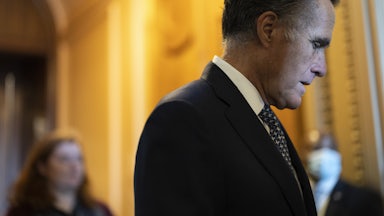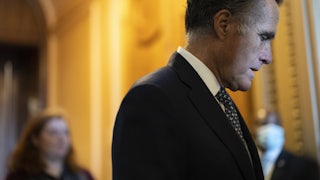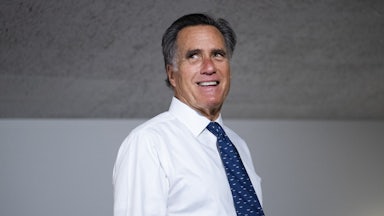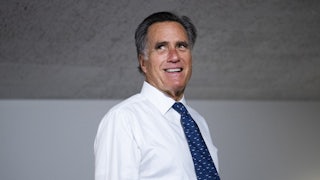On Thursday, after weeks spent in clownish limbo, House Republicans finally banded together and unanimously elected a speaker. Mike Johnson, a Louisiana Republican, is soft-spoken and generally well liked within his conference—a rarity, apparently, given that the party’s four previous nominees for the position all had enough enemies to make their ascent to party leadership impossible. Johnson is vehemently opposed to abortion and same-sex marriage, but he is perhaps best known as the legal architect of Donald Trump’s effort to overturn the 2020 election. Less than 24 hours before Johnson won the gavel, Republicans rejected another nominee—Tom Emmer, their fourth—in part because he voted to certify that election.
How did we get here? The simplest explanation is that the GOP’s slim majority in the House empowers like-minded representatives to vote in blocs: Since it only takes a handful of opposition votes to sink a candidacy, banding together to take down a rival or ideological opponent is easy to do.
Kevin McCarthy, who served as speaker from January until early October, was deposed partly for working with Democrats on government funding deals and partly because Matt Gaetz hated him. Jim Jordan’s nomination failed for a multitude of reasons: Some disliked the way his allies adopted a strategy that involved sending death threats to his critics; a bloc of vulnerable Republicans feared that his brass-knuckles approach to politics would hurt their reelection chances; while others shivved the Ohioian out of revenge for the role he played in sinking both McCarthy’s and the party’s first choice to succeed him, Steve Scalise. Johnson prevailed in large part because he has few personal enemies within his caucus and because Republicans were understandably sick of the chaos.
Still, the ascension—by unanimous vote—of a far-right election denier to the speakership is notable in that it shows the extent to which the Republican Party is still marching in line with Trump’s baton. Johnson’s “Big Lie” legal theories, which involved questioning the constitutionality of Covid-inspired changes to voting laws, were one of the prominent planks upon which Trump and his allies attempted to overturn a lawful election. Johnson’s role in this regard was not seen as disqualifying by any of Johnson’s colleagues. It’s worth noting that should Johnson remain in his post—and Republicans hold onto their majority in the House in the 2024 election—he will be tasked with certifying the results of that election.
How we got here in a broader sense is the subject of a Tuesday New York Times op-ed by Rich Lowry, who is also the editor of the once anti-Trump, currently anti-anti-Trump National Review. In that piece, Lowry makes several reasonable points that are difficult to contest: Right-wing media boosts unserious candidates who make wild overpromises to the party’s base; that base demonizes institutionalists and deifies bomb-throwers; the anti-establishment leanings of these firebrands have been an increasingly important part of the ascendant right; all of which has been fed by the rise of social media and the broader decline of the political party more generally.
To put it more succinctly: Among Republicans today, “stoking outrage is good, blowing things up is useful, and it never pays to get caught doing the responsible thing.” Kevin McCarthy will pay a price for funding the government, but Matt Gaetz will never face any accountability for sending that government into full-blown chaos over a personal beef. All in all, that’s a fairly clear-eyed take on the predicament the Republican Party finds itself in now.
Unfortunately, Lowry has axes of his own to grind that sidetrack his analysis, namely a popular hobbyhorse among the conservative commentariat that posits another theory for the rise of Trump and the far right: that none of this would have happened if Democrats had been nicer to Mitt Romney in 2012:
On top of this, the two losses to Barack Obama, especially the second one, in 2012, convinced many Republican voters that their party was feckless and naïve. Mitt Romney was serious, civic-minded and conscientious, and he got absolutely bulldozed by the Obama campaign, which portrayed him as some kind of monster.
The thinking of a lot of Republicans after that was, basically, If you portray all our candidates as crude, unethical partisan haters, well, maybe we should give you one.
Much has been written about this pet theory suggesting that the slings and arrows that Mitt Romney suffered at the hands of those who—and I can’t stress this enough—were in a presidential race against him, led to the rise of Trump. Writing in Vox in 2020, Zach Beauchamp found that “many conservatives have embraced” the idea that “Democrats smeared the kind and decent Romney so brutally … that Republicans became inured to this kind of argument and convinced there was no advantage to playing nice anymore.… Call it the ‘look what you made me do’ theory of How We Got Trump.”
The Obama campaign did go after Romney, of course, which is what everyone involved should have anticipated when they ended up in a presidential campaign against each other. The Obama campaign effectively painted Romney as an out-of-touch plutocrat who enjoyed ridiculous rich-person pastimes (dressage) and whose only experience with working people was when, as a partner at the private equity firm Bain Capital, he would insist that companies fire them.
Was that portrayal of Romney harsh? Sure, why not? But effective political messaging is about creating metaphors, and Democrats were effective at using Romney’s wealth and experience as a way of defining him as someone who truly favored the interests of the rich and who had, in fact, spent years raking in cash working for an industry that decimated the working class. Romney had one effective argument against this—that he proposed a popular, bipartisan health care bill as the governor of Massachusetts—an accomplishment that may have leveled him up into the running-for-president stratosphere but became toxic among conservatives after his template was adapted by liberals to construct what became Obamacare.
In any case, the “Romney martyr” campaign overlooks a few things. One is that Republicans took scorched-earth campaign tactics to vulgar new heights eight years earlier, when they depicted John Kerry both as an out-of-touch toff who enjoyed ridiculous rich person pastimes (windsurfing) and as a conniving, cowardly figure who lied about his war record in an effort to smear real veterans and undermine the Vietnam War—this latter effort mounted by a gang of actual liars known as the Swift Boat Veterans for Truth. The Democrats did not respond by turning to the same sort of rank demagoguery in the next election, but the GOP topped its own efforts by insisting that Barack Obama was a radical Marxist-cum-Islamic extremist who was so un-American he was literally from Kenya. When John McCain lost to Barack Obama in that election, the conclusion many in the party took—including Donald Trump—was that it hadn’t gone far enough in smearing the country’s first Black president.
But the Romney-as-martyr myth is also dependent on ignoring the other, shrewder parts of Lowry’s analysis. Romney’s loss was blamed by many not on Democratic smears but on the Republican’s establishment credentials and moderate approach to politics. Romney was too stiff, too much of a politician, too burdened by years of compromise. Donald Trump was the anti-Romney in many ways: gruff, unpredictable, and above all, a pugilist. Romney, as governor of Massachusetts—and later as a senator—was a principled conservative who nevertheless understood the necessity of political compromise. This is anathema to the current Republican Party. To win elections, many now believed, Republicans had to abandon not only compromise but governance itself.
The idea of the Romney martyrdom myth is appealing because it absolves Republicans of responsibility for the radical streak the party has cultivated and encouraged for years. Many simply believed that this venal side to their politics could be controlled and suppressed in the service of other political priorities. They were wrong about that, and so they look for comfort in the notion that they didn’t so much fall as they were pushed to this lowly state by Democrats. If Democrats had only been nicer to Romney—maybe just let him win!—none of this would have happened. But Democrats aren’t responsible for ensuring that Mitt Romney glides into the Oval Office at the expense of their own nominee, just as they have no responsibility, as The Washington Post editorial board argued earlier this week, to help elect a Republican speaker. The job of Democrats is to win elections and enact Democratic policies.
Democrats prone to self-reflection might consider whether they treated Trump too casually as a presidential candidate; that he ended up in the White House, at some point, comes down to significant inadequacies in the way Democrats campaigned against him. But this is grist for a different mill. That Trump seamlessly slid into the role of Republican Party standard-bearer is not something over which Democrats ever had control. The idea that they could have prevented Republicans from embracing a candidate who succeeded precisely because he was the ne plus ultra of a Republican standard-bearer is ahistorical and absurd. Establishment Republicans had many opportunities to try to quiet their base’s most ravenous instincts and didn’t. There were numerous occasions when they could have broken with Trump. They didn’t; now they’re paying the price.










